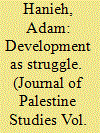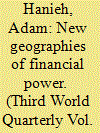| Srl | Item |
| 1 |
ID:
148620


|
|
|
|
|
| Summary/Abstract |
The occupied Palestinian territories (oPt) are a major recipient of global aid flows, ostensibly aimed at improving development outcomes for the Palestinian population. This article presents a critical analysis of the ways that development is being conceived and practiced by major actors in the oPt. By analyzing different conceptions of power, the article examines how dominant approaches to development hide the ongoing reality of Israeli settler colonialism by dehistoricizing Zionism and its project; incorporating the structures of Israeli occupation into official Palestinian development strategy; and promoting an economic perspective that views development as an objective and disinterested process operating above (and outside) power relations. After considering some of the ramifications of current approaches to development, the article concludes with brief remarks on how this critique can help to reframe and articulate an alternative strategy.
|
|
|
|
|
|
|
|
|
|
|
|
|
|
|
|
| 2 |
ID:
171247


|
|
|
|
|
| Summary/Abstract |
A growing body of critical scholarship has examined the recent growth of Islamic finance (IF), unpacking its ethical assertions and highlighting its close affinities with conventional financial instruments. Receiving less attention, however, is the relationship between the global expansion of IF and the emergence of new financial actors and zones of accumulation. This article situates the evolution of global Islamic circuits alongside processes of capital accumulation in the Gulf Cooperation Council (GCC), arguing that contemporary IF is deeply bound up with the internationalisation of capital groups headquartered in the GCC. This is evident in the internationalisation of GCC Islamic banks, which has given the Gulf a powerful foothold in new markets and a variety of sectors that are typically considered ‘non-financial’. Simultaneously, the expansion and geographical diversification of Islamic debt (sukuk) issuance is refashioning the Gulf’s relationships with other global spaces, a process that looks set to intensify given the widespread push to utilise IF in development financing. Seen from this perspective, the global growth of IF sits in a mutually constitutive relationship with patterns of capital accumulation in the Gulf, as well as the region’s burgeoning weight within (and new linkages to) the global economy.
|
|
|
|
|
|
|
|
|
|
|
|
|
|
|
|
| 3 |
ID:
172909


|
|
|
|
|
| Summary/Abstract |
Andrew Ross's Stone Men: The Palestinians Who Built Israel is a significant contribution to an emerging literature on Palestinian labor. Through an examination of various facets of the stone industry in both Israel and the West Bank, Ross develops a series of insights into the nature of settler colonialism, patterns of urban development, the political economy of Palestinian class formation, borders and migration, and the ecological impacts of occupation. By highlighting the ways in which Palestinians actually built Israel, Ross's book carries important implications for how we think about Palestinian political strategy and the debates around one- or two-state solutions.
|
|
|
|
|
|
|
|
|
|
|
|
|
|
|
|